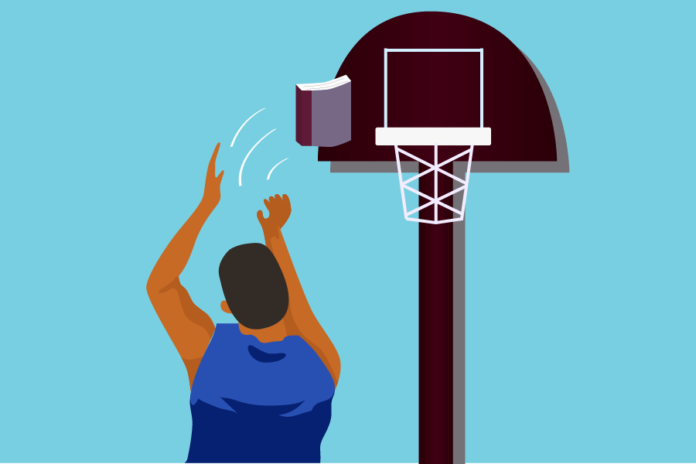NCAA Division 1 athletes must learn to manage practices, games, classes and homework in addition to adjusting to college life.
In addition to moving away from home, becoming accustomed to the college experience and having practices and games up to seven days a week, first-year NCAA Division 1 (D1) student athletes must also find the time to go to class, finish their homework and study for exams.
According to Eline Van Den Bosch, a first-year undeclared major and field hockey player, when her team is in season in the fall, they practice six days a week for three hours each day. Practices are held during the day, which she prefers instead of night practices like she had in high school.
“I just go to class, have practice, then go back to class,” Van Den Bosch said. “I invest a lot of time definitely during season into field hockey. It’s a good combination.”
Due to student athletes’ busy schedules, learning to manage one’s time is important. According to first-year communication major and softball player Megan Bower, learning this balance was difficult in the beginning.
“Having the motivation to want to do my best in my classes, do my best in softball, make new friends and sleep was hard,” Bower said. “It was hard to jump right in at the beginning, but I took it one day at a time, so I didn’t get so overwhelmed.”
For Bower, Fall Quarter was an adjustment period, but she thinks in Winter Quarter she has been more on top of her academics and has learned how to balance her busy schedule better.
Christopher Venable, a first-year human development major and football player, took a summer class to balance his schedule, which helped him learn how to manage his time and create an outline of his weekly schedule. He creates a schedule week-by-week and fills in the information to help him stay on top of his work.
“In my free time, I’ll do extra tutoring and try not to miss out on academics because the coaches are big on that,” Venable said. “During finals, we are in playoffs, so studying football and studying school was hard to balance since we wanted to perform our best in both.”
Student athletes receive extra support to help them with their academics and balance their busy schedules, as they must keep a 2.0 GPA in order to stay in UC Davis’s NCAA athletic programs. According to Venable, Intercollegiate Athletics (ICA) tutoring is mandatory for specific classes for athletes. Drop-in tutoring with academic advisors is also available and many teams have study halls together.
“We have a really supportive team and school system that makes sure we stay on top of our studies and prioritize that over athletics,” said first-year communication major and cross-country and track runner Alexa Bolanos. “They make sure we put in the time we need in both areas, and it’s nice to have that support because without it, it would be really hard to manage.”
Venable’s advice for other athletes is to not get behind in their schoolwork while also constantly communicating with professors and TAs to keep them updated on when their team is traveling and when they’ll miss class.
“If you approach them in the right and respectful way, they are very understanding and will help you be proactive about making a plan,” Bower said. “You can tell them a day you could make the work up.”
Because of the extra support student athletes receive and due to the athletic recruitment that brings many of them to UC Davis, other students may see athletes as having a more privileged collegiate experience, according to Bower. However, she thinks there is a misunderstanding since student athletes work very hard and sometimes need that extra support due to their busy schedules.
“What a student athlete is, is misunderstood,” Bower said. “Sometimes, we are not as smart, but we want to work hard to be in this sport. I have immense respect for the people who got into this school, but athletes work really hard and also want to get a good education.”
Because student athletes are all under similar pressures, it creates a strong bond between team members. According to Bolanos, she had an instant family when she came to Davis early in the school year. She said it was nice to have that large ingrained support system right away.
“My favorite part is the brotherhood,” Venable said. “The relationship on the team, that is where you meet your best friends. Everything you do is with the football team. Sweat, tears, determination, we all bond together.”
According to Bower, even athletes who play different sports all share the same stressors, and can bond over it.
“We all kind of understand what each other are going through,” Bower said. “Even if we play a different sport, we all know how it is to manage sports and be a part of this community. It’s been nice to be a part of a community of athletes.”
According to Bower, athletes have to really love the sport if they are going to play it at the collegiate level. Especially at a D1 school, it is difficult to manage busy schedules and wake up early in the morning to go to practice.
“We are all here because we love the sport, and that’s what we want to do,” Bolanos said. “Knowing that is our motive, on top of getting a great education and loving our classes, it’s so worth it.”
Written by: Margo Rosenbaum — features@theaggie.org




